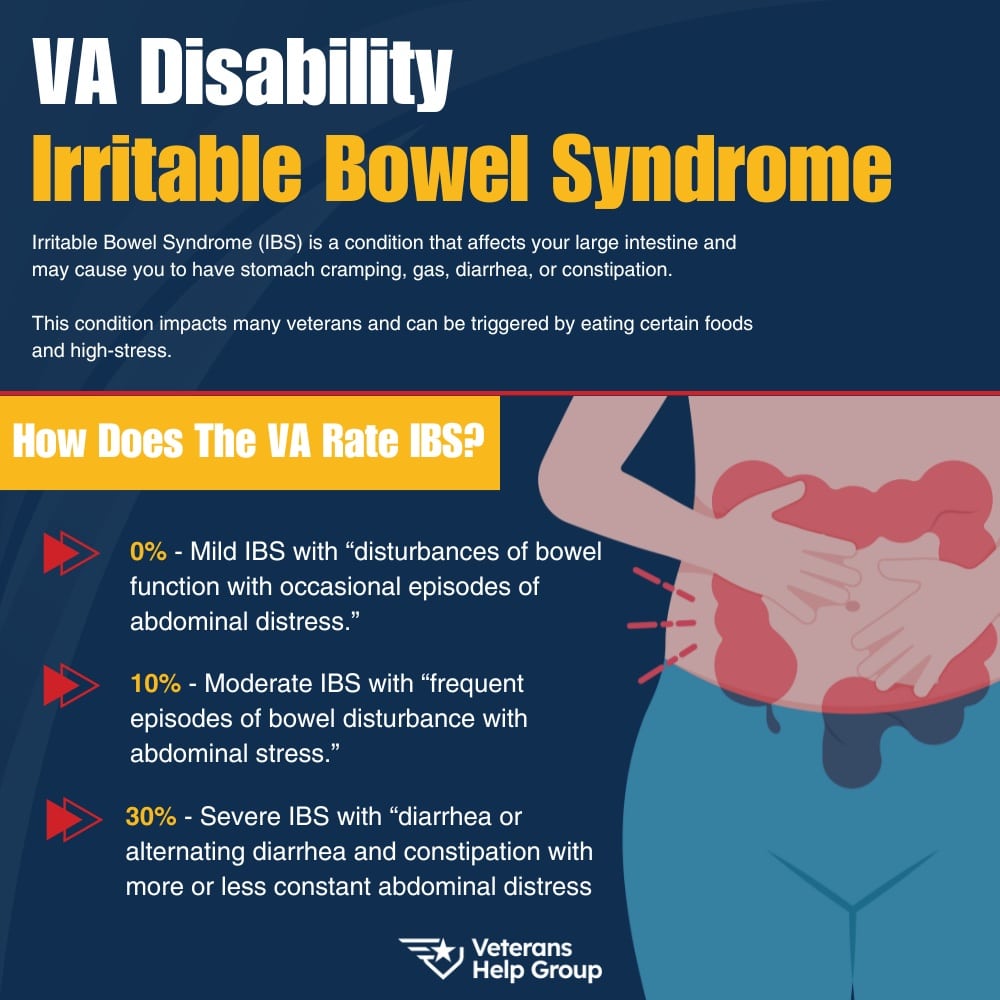
Table Of Contents
How Does the VA Rate Irritable Bowel Syndrome (IBS)?
– Matt Sauerwald, Vice-President, Veterans Help Group
Matt Sauerwald has been a dedicated advocate for Veterans who are seeking help with their VA disability claims. He has represented thousands of veterans and has a thorough knowledge of the Veterans Administration and the VA disability application and appeals processes.
Below, Matt will help answer some commonly asked questions about VA ratings for Irritable Bowel Syndrome and the related benefits.
Table of Contents
VA Disability and Irritable Bowel Syndrome
The VA may recognize irritable bowel syndrome (IBS) as either a service-connected condition or a secondary service connection. Though IBS itself isn’t presumptively service-connected, it may be considered presumptively connected in Persian Gulf War veterans if certain conditions are met.
Here’s what you need to know about IBS, how the VA rates the condition, and what those ratings mean for you.
What is IBS?
Irritable bowel syndrome is a chronic condition that causes a range of digestive-system symptoms, including:
- Sharp pain or cramping in the abdomen
- Abdominal bloating
- Gas
- Constipation, diarrhea, or both
- Mucus in stools
IBS symptoms may be triggered by eating certain foods or periods of high stress. The condition is somewhat unique in that IBS is not accompanied by digestive tract damage. As such, there’s no conclusive test for the condition. After ruling out other conditions through testing, a doctor typically diagnoses IBS based on symptoms.

Irritable Bowel Syndrome Disability Ratings
IBS is rated under the listing for irritable colon syndrome. The schedule includes only three possible ratings: 0%, 10%, and 30%.
A 0% rating is assigned when the condition is mild, characterized by “disturbances of bowel function with occasional episodes of abdominal distress.” When a veteran receives a VA disability rating of 0%, they don’t receive monetary compensation. However, the rating entitles the veteran to medical care for the service-connected condition.
A 10% rating is assigned when the condition is moderate, characterized by “frequent episodes of bowel disturbance with abdominal distress.” At a 10% disability rating, the veteran receives healthcare for the service-connected condition and partial monetary compensation. In 2024, the amount of compensation available at the 10% level is $171.23/month.
A 30% rating is assigned when the condition is severe, characterized by “diarrhea, or alternating diarrhea and constipation, with more or less constant abdominal distress.” At the 30% disability rating, a veteran received healthcare for the service-connected condition and partial monetary benefits. In 2024, the amount of compensation available at the 30% level is $524.31. A veteran with a disability rating of 30% or higher may also receive additional compensation for eligible dependents.
Veterans Help Group is Here for You
Whether you’re just starting a VA disability claim or your IBS claim has been denied, the experienced veterans disability benefits advocates at Veterans Help Group are on your side. Every day, we put our knowledge and experience to work fighting for veterans like you and their families. To learn more about how we can help you submit the strongest possible claim or effectively appeal a VA disability denial, fill out our contact form here or call us today at 855-855-8992.
READ MORE ABOUT THIS:

US Veterans Share Thoughts On Issues Impacting Veterans and their Families
Veterans Share Thoughts On Issues Impacting Veterans, Their Families, Today’s Military and Ways To...

Higher Instance of Epilepsy After Traumatic Brain Injury
Higher Instance of Epilepsy After Traumatic Brain Injury Many events can deliver a blow or jolt to...

How To Secure VA Disability For Your Erectile Dysfunction
How to Secure VA Disability for Your Erectile Dysfunction A veteran may receive VA...





